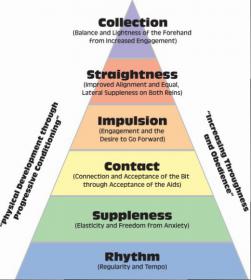hand raise I’m a trainer. Maybe not as experienced or upper-level as some of the others you’ve worked with (or even as some of the people posting in this thread, probably), but I’ve spent a lot of time working with difficult, quirky horses. A majority of my rides have been damaged goods that no one else really wanted to work with.
I have skimmed most of the posts in this thread, but have only read some thoroughly, so I apologize if I repeat things that have already been suggested or addressed.
@J-Lu, remember that when you post on COTH, it is out of your control as to who responds and what they say. I am certain that no one here would wish you or your horse any ill will, so take the good with the bad, use what you can, and don’t worry about the rest. But remember who wrote the first post, asking for input. So to answer your original questions:
… has anyone ridden a very smart but fearful horse whose brain goes a million miles an hour?
Yes, with variations. One was fearful but brain fried, so instead of a million miles an hour it was more like .0001 miles an hour. Dangerous. Another is freakishly smart, no real fear but all the antics, and clever clever. Another is a very intelligent creature but afraid or “afraid” of things at random and hypervigilant, with lightning fast reactions. There are others.
A horse who notices all things out of place and is fearful because of that?
Yep. Rearranging of furniture is not appreciated. But we manage.
Gets spookier when the work amps up even though he’s physically capable of doing it (and sometimes is excellent doing it - no physical issues)?
Maybe not spookier per say but more certainly more aware and sensitive, which is needed for higher quality, higher level work and is a direct result of that development. Occasionally a little of that awareness and sensitivity leaks out. Sometimes it all comes together and feels excellent, sometimes it doesn’t.
Can go through mental phases where s/he listens to your aids and others were s/he’s truly freaked out by something?
Yes, definitely. As I said, sometimes it comes together, and sometimes it doesn’t. If the horse listened to the rider’s aids all the time no matter the circumstances I’d probably be out of a job, as would many others.
Any suggestions about how to approach the training?
Many things come to mind. Most (if not all) have already been suggested in some way or another. I’ll throw out some ideas below. Without seeing you/him in action it’s hard to offer advice on something that is so “in the moment.”
Any supplements that worked for you?
Not specifically. Calming supplements are meh… Maybe Magnesium/Vit E for the ones who tend to be body tense. Maybe an ulcer preventive for the tummy. Otherwise, just a balanced diet and turnout, both of which I know you are already doing.
General suggestions or things to consider:
1 - This was discussed briefly early in the thread… Have you thoroughly checked out the area at, around, and beyond the GoD? Consider how that area looks and sounds to him when you approach while riding in the arena. Is something weird happening only sometimes as you ride by? Maybe he is catching a glare or reflection in the distance, or hearing an unusual sound? Pretend to be your horse for a minute and explore the possibilities of how the GoD and the farm around it is perceived by him. It doesn’t much matter how it is perceived by us.
2 - Can you set up cavaletti right by the GoD and work him over that? Could be on the lunge or under saddle. That would give him something else to look at and pay attention to over there, and might be a good way to have him focus naturally rather than fussing, fighting, or having to resort to poking him with the spur to get his attention. I wouldn’t set them up with perfect distances either… Make it challenging (but safe!) so that he has to sort out foot placement and length of stride. Change gaits and distances often.
3 - This also applies to lunging and riding. Very simple and correct upward transitions TOWARDS GoD or other scary thing, downward transitions AWAY from scary thing. Praise on both, make him feel like a rockstar, even for the smallest thing. This is to promote bravery and discourage fleeing.
4 - One note for you, OP. You mentioned being pretty brave and even cavalier in your riding, and not afraid of this guy, but sometimes I think that is a coping mechanism for what is actually a lack of confidence. And NO ONE would judge you for losing confidence, given the circumstances. I think some riders do get afraid, but to either hide it, cope with it, or resist it, we get “tough.” Sometimes we are able to pull off amazing feats despite (or maybe because of) being scared. In your case, you seem to be ready to throw down (for lack of better words, sorry) with this horse if need be, but is that because you actually are afraid of what he might do? That would be very reasonable. Anyway, I learned this about myself (not just in horses) and have worked hard to improve it so I thought I’d share.
As a side note, there are many talented, successful, “qualified” trainers out there who know surprisingly little about problem identification and problem solving. That may not be the case here, but I thought it was worth mentioning.


